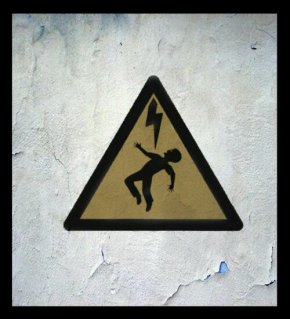“10My son, if sinful men entice you, do not give in to them. 15My son, do not go along with them, do not set foot on their paths; 16for their feet rush into evil, they are swift to shed blood. 17How useless to spread a net where every bird can see it! 18These men lie in wait for their own blood; they ambush only themselves! 19Such are the paths of all who go after ill-gotten gain; it takes away the life of those who get it.” -Proverbs 1:10,15-19

There are many things we find when studying the word. One of these is the honesty in which the Word addresses sin. What I mean is that it offers a kind of paradox. On one hand the warnings against sin are stern, but on the other hand the desire we have to sin or become disobedient is made evident. This paradox of course is settled by the grace of Jesus Christ. Here it is no different in sharing the tempting natures of sin. Verse 10 points out how sin and even the sinful can entice one. Sin can look glamorous or even fulfilling, but we know from both empirical evidence, namely our experience, and from the Scripture, that there is nothing further from the truth. Our enemy is not beyond using others to temp us and we should constantly keep this in remembrance. We should not give into the enticing appearance of sin, for the path that following sin puts us on is one that leads straight to death. Those who are of a sinful nature stroll upon these paths to ruin. Their paths are not straight, but crooked, winding and unsafe. How swift to shed blood and resort to violence are they who stroll upon this path. In addition, all forms of sin become their traveling companions and one should look to avoid such company. These men sabotage and ambush themselves.
“How useless to spread a net where every bird can see it.” —Proverbs 1:17

For a moment Verse 17 confused me. Yet, when I read 18 it began to make sense. The man whose feet rush quickly into evil are their own enemy. Going back to verse 15 it got me to thinking, “Do all sinners enjoy shedding blood?” No, I believe there exists a distinction here. Not a distinction that allows excuse to be made, for all men will be without excuse, but rather there are several types of sinner the Bible mentions. Elsewhere in Scripture we are given distinctions of outward rebellion in sin, conceptual sin, grievous sin, habitual sin, and finally sins of iniquity. There can be another distinction made concerning Verse 10. These are those who struggle against sin and accept the Lord’s grace for sinning, for purposes of distinction I will refer to this as reluctant sin and the other as willful sin. I do not say “reluctant” because I wish to belittle the personal responsibility in sin. Rather, I use this term for lack of others at the top of my head, and for strictly distinction. Reluctance denotes a slowness or hesitation to sin, which means one is slow in sinning and quick to receive grace offered. Willful sin however, as is the category those whose feet rush into evil belong, denotes a quickness to sin and a slowness to receive grace offered. A major component of receiving grace properly is to repent, or turn from sin. Grace offers us the ability to do so, and not to excuse indulgence in sin.
The willful and “fast” sinner is the one who is quick to shed blood. Even “reluctant” sinners are not so quick to shed blood and still can detest violence and in fact be peacekeepers. The paths of these willful sinners end in ruin. They will not see success, for verse 17 says they will sabotage themselves. Casting an obvious net to catch a bird conflicts with one’s desire. If one wishes to be successful in such an endeavor, they need to cast a concealed trap and after run and hide. We too should run and hide from sin, lest we be as the man who casts an obvious net only to be met with no success whatsoever.
Success is an interesting paradox with profound meaning, in that the more a person strives for it, the more distant it can become. In his book, “Man’s Search For Meaning,” holocaust survivor Viktor E. Frankl states:
“Don’t aim at success – the more you aim at it and make it a target, the more you are going to miss it. For success, like happiness cannot be pursued; it must ensue and it only does so as the unintended side-effect of one’s dedication to a cause greater than oneself. Happiness must happen, and the same holds for success; you have to let it happen by not caring about it. I want you to listen to what your conscience commands you to do and go on to carry it out to the best of your knowledge, then you will live to see that in the long run – in the long run I say! – success will follow precisely because you had forgotten to think of it.” —Viktor E. Frankl

The success of the sinner fails in that the success is based on the self, rather than on something greater than the self. Even those entrepreneurs who hold vast wealth because of the establishment of goods and company, do so because they believe in a cause greater than themselves. Of course this cause can be almost anything to supplying that which the world lacks to wanting to change or better things that already exist. The Christian has an even greater cause and this dedication is based on God’s will and not the will of the self. This leads to success.
I could use my very blog as an example. Whenever I focus on writing for an audience, rather than extrapolating the deep mysteries found within the Scripture and how it speaks to me personally, I find my writing, as well as my contemplation to wane to a vast degree. The more I forget about the audience which may or may not find their way to my blog, the better my writing and logical analysis. Whenever I try to impress with wit or wisdom, I find it all the more lacking, than when I humbly approach the Word and let it lead me in the way the Lord wills. However, if I have a particular goal greater than myself, as in sharing the message the Lord has deemed important, and focus on that alone, the more success I feel I have in my blog entry.
Quick to sin men are prideful, arrogant and violent according to the Word. His focus is so on the self, in the end, he will see no success by his sinful endeavors. They lie in wait, says Verse 18, to ambush only themselves. Their own actions testify against them so that their bitter means cannot bring sweet results. There are results which pacify, so let us not deny. Yet, where and by what means do these ends eventually lead. As we have mentioned, they lead to ruin, destruction, and death. By spilling other’s blood for gain, they spill their own. They contradict self, seeking to further self, they deteriorate it. The ultimate self-treason.















